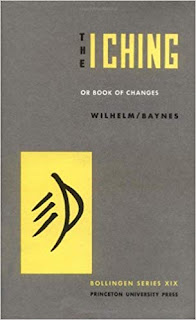I Ching is not a sorcerer. It is a psychologist.
I am anti choice. I
dislike making decisions. A number of years ago I faced a complex dilemma. I
had to select between two choices of ambivalent value. The wrong choice would
probably be bad for me. Even the right choice held dangers if I did not respond
correctly to it.
I went to I Ching, tossed my three coins, and read what it said in the hexagram the coins directed me to. What I read was appropriate to my circumstances. I was still not ready to make my choice, but I had a better understanding of the situation in front of me. I wrote down the hexagram, and took notes on what I Ching told me.
Then I lost my notes. Because I still needed to make my decision, I tossed the three coins again, and went to the hexagram they told me to study.
I was astonished. I was told to go to the same hexagram I had been directed to the first time. The chances of this happening were one in 4,096. I Ching is magic, I concluded. I wrote down the hexagram, and took notes on what it told me about my situation.
Several days later I found my first notes. It turned out that with two tosses of the coins I had been directed to two different hexagrams. Nevertheless, in each case what I read was relevant to my situation. Each hexagram helped me make a difficult decision that turned out to be in my interest.
I Ching is not magic. In a sense it is even more remarkable. It does not serve as a sorcerer, but as a skilled psychologist, one who asks the right questions, helps you to understand aspects of your subconscious mind, and who helps you to solve your problems.
Astrology is somewhat the same. The next time you read your horoscope in a newspaper, do not read what it says for your sign. Read what it says for another sign. If you are facing a problem in your life you will probably find that the writing for the other sign is helpful. Then read your sign. It too is helpful. Finally, read the horoscope in another newspaper, and see what it says for your sign.
There will probably not be any similarity in what the two different horoscopes say about your sign. Nevertheless, each will be helpful.
I have never worked with tarot cards. I suspect that they work the same way. I Ching, astrology, and tarot are evocative. Their ambiguous messages encourage you to project your concerns into them. In the process they help you in ambiguous situations.
The use of the yarrow-sticks or the coins is a way to encourage one who consults I Ching to believe that there is something super natural in its working. What would be less psychologically interesting, but equally effective would be to use a roulette wheel with 64 slots, or to cut 64 small pieces of paper, write one to sixty four on the pieces, put them into a hat, shuffle the hat, close your eyes, and pick a piece of paper. Any one of the 64 hexagrams can give you helpful insights and advice.
Epictetus said that a gambler cannot determine the roll of the dice. He can determine what he will do when the dice stop rolling.
I Ching will not tell the future. It will not give you a winning lottery number. It will not tell you which horse will win a race. It will not tell you which stocks will gain in value, and which will lose. It will not tell you that next week you will receive a letter from a former love interest you have neither seen for years nor been able to forget. It will help you decide how to respond to that letter, if you received it last week.
I went to I Ching, tossed my three coins, and read what it said in the hexagram the coins directed me to. What I read was appropriate to my circumstances. I was still not ready to make my choice, but I had a better understanding of the situation in front of me. I wrote down the hexagram, and took notes on what I Ching told me.
Then I lost my notes. Because I still needed to make my decision, I tossed the three coins again, and went to the hexagram they told me to study.
I was astonished. I was told to go to the same hexagram I had been directed to the first time. The chances of this happening were one in 4,096. I Ching is magic, I concluded. I wrote down the hexagram, and took notes on what it told me about my situation.
Several days later I found my first notes. It turned out that with two tosses of the coins I had been directed to two different hexagrams. Nevertheless, in each case what I read was relevant to my situation. Each hexagram helped me make a difficult decision that turned out to be in my interest.
I Ching is not magic. In a sense it is even more remarkable. It does not serve as a sorcerer, but as a skilled psychologist, one who asks the right questions, helps you to understand aspects of your subconscious mind, and who helps you to solve your problems.
Astrology is somewhat the same. The next time you read your horoscope in a newspaper, do not read what it says for your sign. Read what it says for another sign. If you are facing a problem in your life you will probably find that the writing for the other sign is helpful. Then read your sign. It too is helpful. Finally, read the horoscope in another newspaper, and see what it says for your sign.
There will probably not be any similarity in what the two different horoscopes say about your sign. Nevertheless, each will be helpful.
I have never worked with tarot cards. I suspect that they work the same way. I Ching, astrology, and tarot are evocative. Their ambiguous messages encourage you to project your concerns into them. In the process they help you in ambiguous situations.
The use of the yarrow-sticks or the coins is a way to encourage one who consults I Ching to believe that there is something super natural in its working. What would be less psychologically interesting, but equally effective would be to use a roulette wheel with 64 slots, or to cut 64 small pieces of paper, write one to sixty four on the pieces, put them into a hat, shuffle the hat, close your eyes, and pick a piece of paper. Any one of the 64 hexagrams can give you helpful insights and advice.
Epictetus said that a gambler cannot determine the roll of the dice. He can determine what he will do when the dice stop rolling.
I Ching will not tell the future. It will not give you a winning lottery number. It will not tell you which horse will win a race. It will not tell you which stocks will gain in value, and which will lose. It will not tell you that next week you will receive a letter from a former love interest you have neither seen for years nor been able to forget. It will help you decide how to respond to that letter, if you received it last week.


Comments
Post a Comment